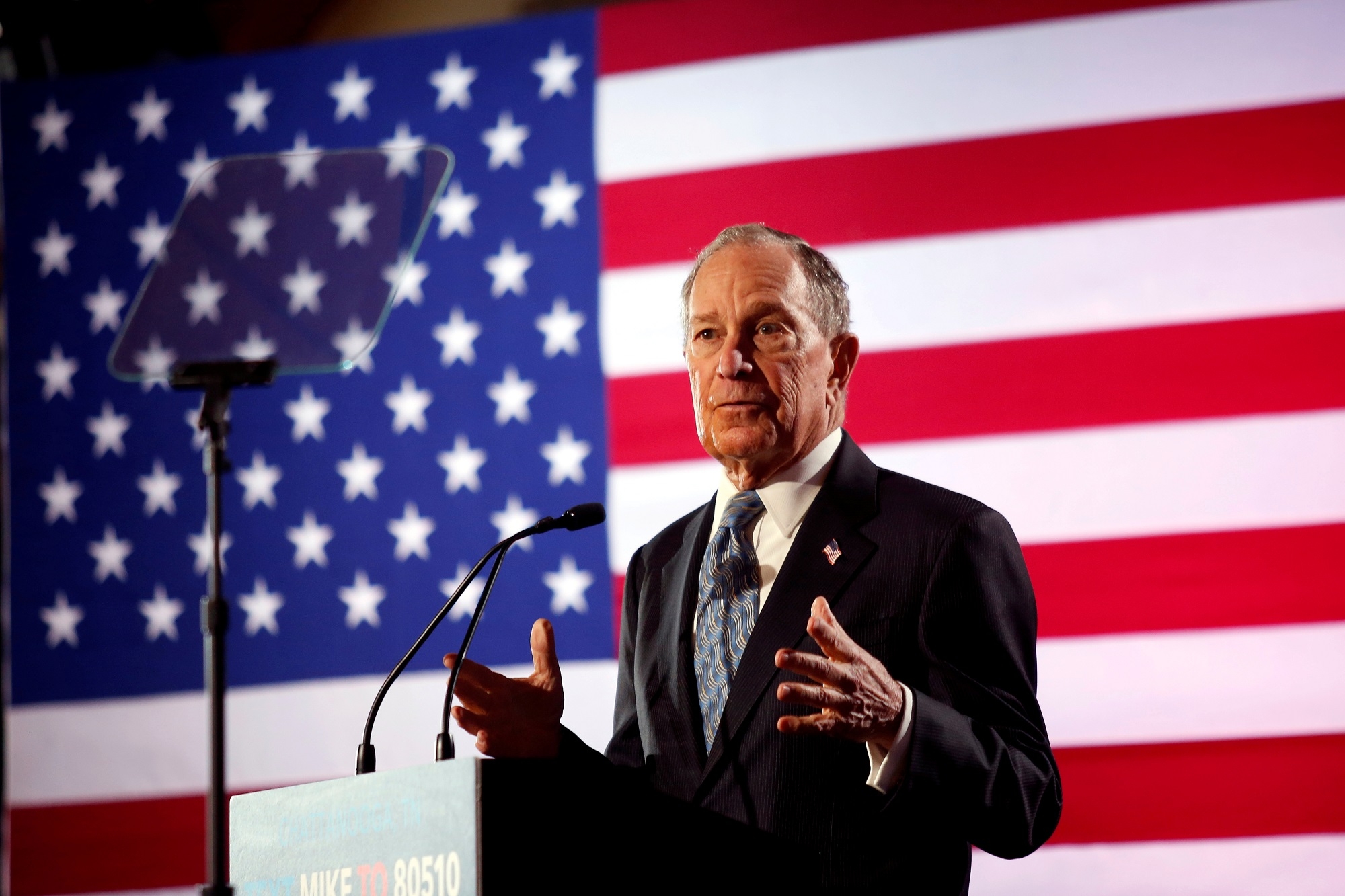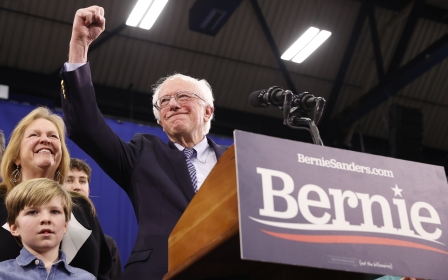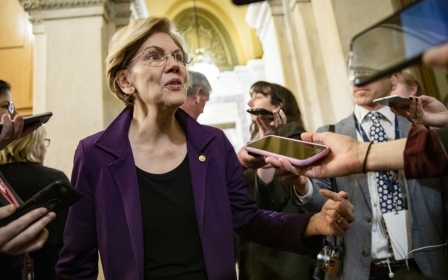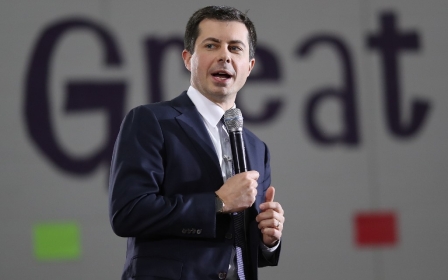US election 2020: Where does Mike Bloomberg stand on Middle East issues?

Democratic candidates have been campaigning for more than a year to convince the party's supporters that they are best-suited to beat Donald Trump in November's election.
Seven presidential debates and two primaries later, a candidate who has been on the peripheries of the process, is now breaking out as a top-tier contender.
Former New York City Mayor Michael Bloomberg is yet to appear on the debate stage, and his campaign skipped the early contests in Iowa and New Hampshire - where his name even failed to appear on the ballot.
But now, he's emerging as a popular option within the party. Recent national polls show him rising to third place nationally, leapfrogging candidates who have been perceived as frontrunners for months.
Bloomberg's approach of spending hundreds of millions of his own dollars to win the presidency has raised concerns amongst many critics who want to minimise the role of money in American politics.
New MEE newsletter: Jerusalem Dispatch
Sign up to get the latest insights and analysis on Israel-Palestine, alongside Turkey Unpacked and other MEE newsletters
His surveillance programme against Muslim communities in New York as well as his "stop and frisk" policy have caused a whirlwind of rebuke against his campaign.
Who is Michael Bloomberg?
The former mayor's pitch to voters has been mainly focused on electability - that he alone can beat Trump in the general elections. (Polls show almost all leading Democrats winning in a potential head-to-head with Trump).
Bloomberg has also been an outspoken advocate of liberal causes like environmental regulations and gun control. In 2018, he backed dozens of Democratic candidates for Congress with millions of dollars, helping the party regain control of the House of Representatives.
The 78-year-old businessman - a graduate of John Hopkins and Harvard universities - attained billionaire status after founding his international financial services company, Bloomberg LP.
Bloomberg was elected mayor of New York City as a Republican in 2001. He changed his political label to "independent" by the time he left office late in 2013 after three terms in charge of America's largest city.
While Bloomberg has faced ample scrutiny over his record as mayor, his policies and plans for the presidency remain vague - especially when it comes to foreign policy.
The foreign policy section of his campaign website is void of any concrete plan or detailed policy positions other than touting involvement in international organisations.
But the few interviews he has given on the subject show that he is at odds with the rest of the Democratic candidates on Middle East issues, especially his fellow contenders' tough stance on Saudi Arabia.
While virtually all 2020 Democratic hopefuls vowed to fundamentally change Washington's relationship with Riyadh after the assassination of Jamal Khashoggi, Bloomberg openly praised the Saudi leadership months after the murder.
Here's where the former mayor stands on some hot button issues in the region.
On Saudi Arabia: 'They have made progress going in the right direction'
While other Democratic candidates have been trying to outdo each other in condemning Saudi Arabia for its human rights abuses in Yemen, imprisonment of dissidents and the killing of Khashoggi, Bloomberg has struck a softer tone on the kingdom when asked about the subject.
In an interview with the Saudi-owned publication Arab News last September, Bloomberg praised the Saudi leadership over what he called efforts to "take that country into the new world".
"They have made progress going in the right direction," said the former mayor, who met with Saudi Arabia's Mohammed bin Salman in 2018 during the crown prince's visit to New York.
Failing to mention the women's rights advocates who have been imprisoned, tortured and sexually harassed in the kingdom, Bloomberg also lauded Saudi rulers for "reforms" that improved women's conditions in the kingdom.
"I have had a number of women come up to me and say you don’t understand this is the best thing that has ever happened to Saudi Arabia because half the population was cut out and now they are going in the right direction," he said.
This stance puts him in stark contrast with other frontrunners in the race.
Senator Bernie Sanders has called for ending US support for the Saudi-led war in Yemen and changing Washington's ties with the "despotic" government in Riyadh. Former Vice President Joe Biden pledged to turn Saudi Arabia into a "pariah" state if he wins the elections.
Even when asked directly about Khashoggi by the Council on Foreign Relations in January, Bloomberg prefaced his condemnation of the murder with stressing the importance of US-Saudi ties - sounding more like Trump than his Democratic rivals.
"The US-Saudi relationship remains critical both to stability in the Middle East and to global energy markets," Bloomberg said.
"The US should work with the Saudis to counter Iran’s hegemonic behaviour in the region, manage reasonable oil prices and reinvigorate the Israeli-Palestinian peace process."
He went on to criticise Trump for giving Riyadh a "blank check".
"I would make it clear in public and private that the Saudi government must work to end the human rights crisis in Yemen and improve its own human rights record, including the way it treats women," Bloomberg said.
On Iran: Opposed nuclear deal, but says Trump is wrong for nixing it
Bloomberg opposed the Iran nuclear agreement when it was first signed in 2015, but now he says it was wrong for Trump to leave it.
The multilateral pact saw Iran scale back its nuclear programme in exchange for lifting sanctions against its economy.
"While the agreement was not perfect - it did not address Iran’s ballistic missile program, and it gave the regime political cover to step up its aggression in the region - the US had an obligation to keep its word once the agreement was in place," a spokesman for the Bloomberg campaign told the Jewish Telegraphic Agency in January.
"The US withdrawal has allowed Iran to abandon its own obligations under the deal and has left the world with few tools to stop it."
Mirroring the stance of his Democratic competitors, Bloomberg's campaign told the New York Times that he would return to the deal without pre-conditions. But in the same interview, Bloomberg said he would keep the current sanctions against Iran, which would be in violation of the nuclear deal.
"Mike believes that the US needs a coherent strategy to counter Iran," the campaign told the Times.
"That includes reviving and strengthening the US-Iran nuclear agreement; maintaining current sanctions against Tehran until it changes its behaviour; working within the UN Security Council to constrain Iran’s missile development; and reinforcing relations with our Arab partners to resist Iran’s hegemonic ambitions."
On the killing of top Iranian general Qassem Soleimani, Bloomberg again drew a sharp contrast with his Democratic rivals, who denounced the strike as reckless and legally questionable.
"Was it legal? Yes. Was it justifiable? Yes, provided we had intelligence on an imminent threat to Americans," Bloomberg's campaign told the Times.
Many Congress members from both parties have challenged the administration's assertion that the slain Iranian general posed an "imminent threat" to US troops and interests in the region.
On Israel-Palestine: 'Israel is the closest and most reliable US ally'
As the progressive base of the Democratic party calls for a more balanced approach to the conflict, Bloomberg has remained a staunch and vocal supporter of Israel.
The former New York mayor told the Council on Foreign Relations in January that Israel is the "closest and most reliable" American ally in the Middle East.
"Our diplomatic, military and intelligence agencies work closely with their Israeli counterparts to promote the security of both countries," he said.
"I believe that America’s ability to defend its interests in the Middle East depends on Israel."
And while he says he backs a two-state solution that would lead to the establishment of an independent Palestinian state, the former mayor adds that his "bedrock commitment would be that any two-state solution ensures Israel's security".
In the same interview with the Council on Foreign Relations, Bloomberg borrowed a page out of Jared Kushner's book in stressing economic prosperity, instead of sovereignty for Palestinians.
"The Palestinian people deserve leadership that prioritises basic services, sanitation and economic opportunity," he said.
Bloomberg's advocacy for Israel dates back years. During the 2014 Israeli war on Gaza, the former mayor flew to Israel in a show of solidarity despite a temporary ban by the US Federal Aviation Administration on flights to Israel over safety concerns.
After an Israeli shelling killed 16 Palestinian civilians at a UN school in Gaza, in an attack described as "totally indefensible" by the Obama administration during the same war, Bloomberg defended the strike, accusing Hamas of hiding amongst civilians.
"Nobody is attacking schools or hospitals. We are attacking Hamas," Bloomberg said during an interview with Face the Nation.
Other notable views
Despite endorsing then-President George W Bush in 2004 a year into the Iraq war, Bloomberg said recently that the invasion that toppled Saddam Hussein was the biggest US foreign policy mistake.
"That catastrophe led to the deaths of 4,400 Americans and the wounding and continued suffering of 32,000 more; caused the deaths of roughly 200,000 Iraqi civilians; destabilised much of the Middle East; contributed to the rise of a hegemonic Iran; produced al-Qaeda in Iraq and then ISIS; cost US taxpayers an estimated $2.4 trillion; and made us lose sight of our mission in Afghanistan," Bloomberg told the Council on Foreign Relations in January.
On US troops in Afghanistan, Iraq and Syria, Bloomberg has said he would keep a small number of soldiers in those regions to ensure a lasting defeat for militant groups like al-Qaeda.
"I would leave a small, residual force in Afghanistan focused solely on intelligence-gathering and counterterrorism, to prevent the country from becoming a safe haven for al-Qaeda and Islamic State," he told Military Times earlier this year.
"US special operations units have also served bravely and effectively in Iraq and Syria to roll back Islamic State. Unlike President Trump, I would not withdraw those forces suddenly, placing them and the larger mission at risk, on a whim or a phone call."
Middle East Eye delivers independent and unrivalled coverage and analysis of the Middle East, North Africa and beyond. To learn more about republishing this content and the associated fees, please fill out this form. More about MEE can be found here.




